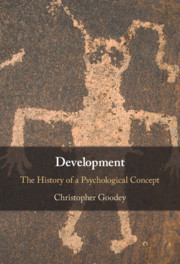Book contents
- Development
- Development
- Copyright page
- Contents
- Acknowledgements
- Introduction
- Chapter 1 Development and the Origin of Psychological Concepts
- Chapter 2 The History of Christianity and the First Principles of Development: Linear Time, Interiority, Structure
- Chapter 3 The History of Education: Rearing the Elect Child
- Chapter 4 Pascal on the Ordering of Human Time
- Chapter 5 The Normalization of the Elect: Locke to Montesquieu
- Chapter 6 The Coining of a Developmental Theory: Leibniz to Bonnet
- Chapter 7 Emile: Rousseau’s Well-Ordered Developer
- Chapter 8 Nature versus Nurture and Cognitive Ability Testing: Historical Sketches
- Postscript Further Targets for Historical Research
- Index
Postscript - Further Targets for Historical Research
Published online by Cambridge University Press: 10 June 2021
- Development
- Development
- Copyright page
- Contents
- Acknowledgements
- Introduction
- Chapter 1 Development and the Origin of Psychological Concepts
- Chapter 2 The History of Christianity and the First Principles of Development: Linear Time, Interiority, Structure
- Chapter 3 The History of Education: Rearing the Elect Child
- Chapter 4 Pascal on the Ordering of Human Time
- Chapter 5 The Normalization of the Elect: Locke to Montesquieu
- Chapter 6 The Coining of a Developmental Theory: Leibniz to Bonnet
- Chapter 7 Emile: Rousseau’s Well-Ordered Developer
- Chapter 8 Nature versus Nurture and Cognitive Ability Testing: Historical Sketches
- Postscript Further Targets for Historical Research
- Index
Summary
The themes from this book require extending into other research areas. First, the history of political thought and ideas: psychology itself is an idea, since modern political thought emanated not only from thinking about ‘man’ but also from what the thinker believed himself to be, qua man: that is, his interior religious and/or psychological status. Second is the history of education, where the importance of the German-language tradition (Schleiermacher, Herbart, Froebel) might lead to studying the idea of universal salvation as a founding discourse of modern schooling, and the ‘developer’ as the individual embodiment of social and national progress. Third comes disability history, concerning institutions and asylums, which has encouraged a single reified notion of developmental disability; a critical conceptual history should make it possible to stand outside this. The fourth area is literature. The novel is the classic literary ‘form’ of a linear developmental narrative, but its historical examples reveal it to be a constant subversion rather than reflection of the developmental idea, even in the typical novel of personal formation (Bildungsroman).
Keywords
- Type
- Chapter
- Information
- DevelopmentThe History of a Psychological Concept, pp. 205 - 207Publisher: Cambridge University PressPrint publication year: 2021

